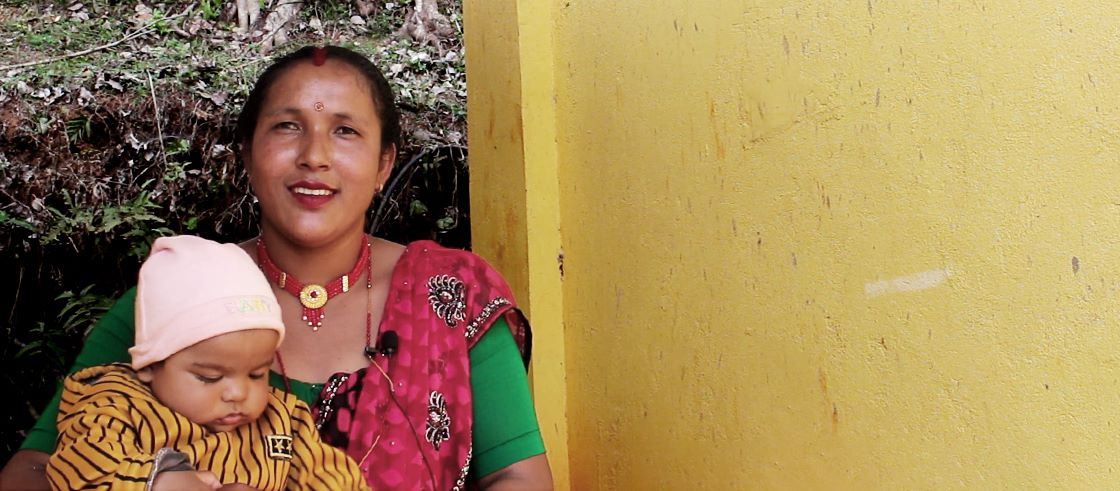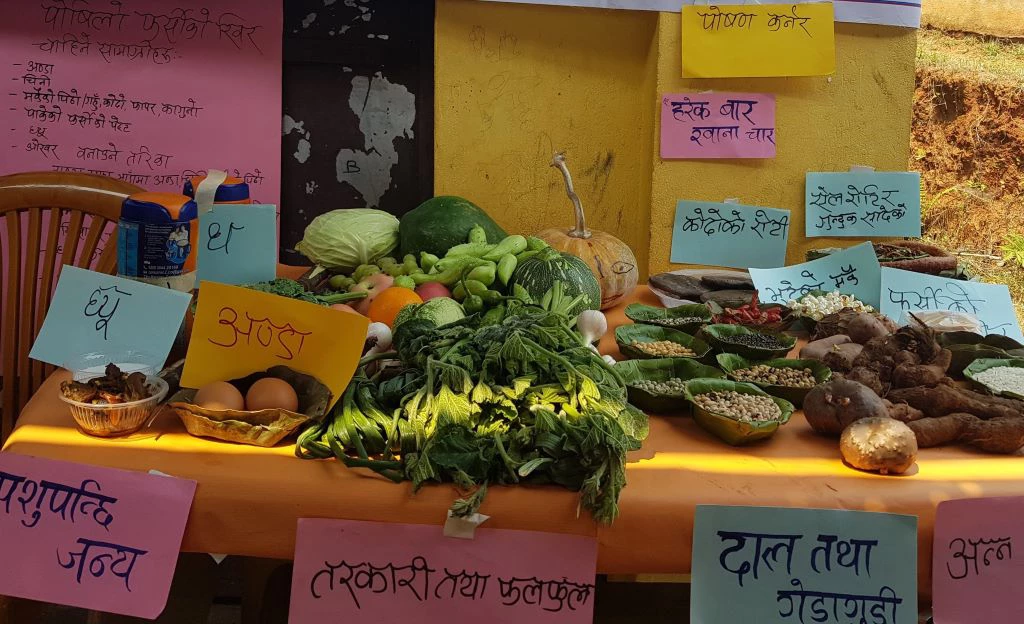 Rita Bishwakarma holds her son in her lap
Rita Bishwakarma holds her son in her lap
We’ve always wondered why Nepal has a very high rate of child malnutrition, as 31.5 percent of children under five are stunted. This is higher than Asia’s average of 21 percent. One-third or 39 percent of children under 5 are underweight.
The reasons for this include insufficient health services and inadequate maternal and child care during pregnancy. Furthermore, extreme poverty, hunger, poor hygiene, and limited access to education are significant causes of high malnutrition rates.
Inappropriate infant and young child feeding practices, along with food insecurity in remote areas, directly impact nutrition due to food unavailability, poverty, and lack of access.
This is a very alarming statistic that demands innovative solutions.
Scaling up interventions like providing Vitamin A and Zinc micronutrients for children expanded childhood immunization, school-based nutrition programs, and support for women’s reproductive health can address these issues.
Similarly, prioritizing nutrition during the critical first 1000 days of life is essential. Regular growth monitoring of children and implementing behavior change through community nutrition programs and community-based management of acute malnutrition, including diversified diets and climate-smart agriculture approaches offer more sustainable solutions for addressing nutrition.
In discussing further potential solutions, we were curious to know just how impactful improving nutrition security among rural communities can be – through programs like the Food and Nutrition Security Enhancement Project (FANSEP) initiative.
We got our answer during our recent trip to Gajuri Rural Municipality in central Nepal. There, we met 30-year-old Rita Biswakarma who has an amazing story to share which demonstrates how changes in diets could help improve the nutritional health of families.
Until 2020, Rita used to work on her small plot of land and grew staple food such as rice and maize. It was neither sufficient for her family of five nor did it meet their nutritional needs. Her daughter used to be weak, malnourished, and fell sick frequently.
Today, Rita works on the same plot of land but grows a variety of crops and vegetables rich in nutrients. It provides her family with a diverse and nutritional diet. As a result, her seven-year-old daughter has grown healthier and stronger.
Today, Rita works on the same plot of land but grows a variety of crops and vegetables rich in nutrients. It provides her family with a diverse and nutritional diet.
A step towards change
Nutrition field schools (NFS) bring together community members to identify barriers to improving pregnant and lactating women’s diets. It provides skill-based nutrition education based on locally available nutrient-dense foods, home nutrition gardens, cooking demonstrations, and food safety.
Rita learned the causes and consequences of malnutrition at the NFS and also found out that her daughter was malnourished following a test conducted there.
The nutrition field schools are supported by the World Bank-financed Food and Nutrition Security Enhancement Project (FANSEP) funded by Global Agriculture and Food Security Program Trust Fund grant.
Sustaining the change
After the knowledge and practical skills in diversifying dietary practices, Rita has now turned her fallow backyard into a home nutrition garden and others in her community are also following her footsteps.
Rita received improved varieties of seeds and inputs as well as financial support for kitchen gardening and poultry raising from the nutrition field school.
In these gardens, community members practice mixed cropping that includes vegetables, fast-maturing fruit saplings, and plantation crops together with poultry and livestock rearing, which serve as a supplementary source of both food and income.
“I now grow seasonal vegetables and pulses, and raise chickens in my own backyard,” said Rita who makes extra income by selling the surplus produce. This has enabled her to increase the consumption of eggs and meat for herself. As a result, she is better able to breastfeed her six-month-old son more regularly.

Nurturing resilient growth with investments in nutrition
Rita is one among the 20,842 direct beneficiaries under FANSEP whose households have benefited from the nutrition-related interventions from the project. The project has already covered 98% of its target beneficiaries through 144 nutrition field schools (NFS) and 854 home nutrition gardens.
FANSEP helped the community in enhancing access to nutritious food and teaching essential skills for daily food cultivation, purchase, processing, and preparation. It also provided knowledge on the growth monitoring of children. These elements are crucial in adopting a holistic approach to preventing micronutrient deficiencies and promoting good nutrition.
Rita is one among the 20,842 direct beneficiaries under FANSEP whose households have benefited from the nutrition-related interventions from the project.
Additionally, the NFS offered hands-on training in crop care and maintenance, covering soil preparation, harvesting, and post-harvest practices. Groups met regularly to observe their crops, analyze the situation, and adjust management techniques for improved productivity.
We felt that a skill-based learning approach through nutrition field schools and adopting behavior change theory to learn best feeding and nutrition practices are key elements in overcoming malnutrition.
Furthermore, providing packages of inputs such as seeds and fertilizer and training services to target beneficiaries are also critical.



Join the Conversation